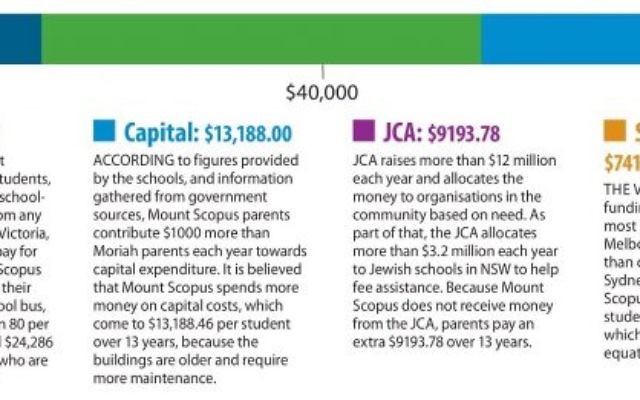Government subsidies and cross-subsidies
A LACK of government funding and increased cross-subsidisation make Melbourne Jewish schools significantly more expensive than their Sydney counterparts.
Joshua Levi
A LACK of government funding and increased cross-subsidisation make Melbourne Jewish schools significantly more expensive than their Sydney counterparts.
Mount Scopus College, Bialik College, The King David School and Leibler Yavneh College are the four most expensive Jewish school in Australia.
Full-fee paying Mount Scopus parents pay more than $414,000 for 13 years of education, including the bus for many years, while Moriah College parents in Sydney will only pay $332,000.
The staggering difference is reflected across the board when comparing King David and Bialik in Melbourne to the Emanuel School in Sydney.
Of equal concern to Melbourne Jewish parents, is the gap between Jewish schools and comparable independent private schools.
In Sydney Moriah College is $70,000 cheaper than Sydney Grammar and Cranbrook over 13 years, but in Melbourne Mount Scopus is more expensive than Melbourne Grammar, Trinity Grammar, Caulfield Grammar and MLC.
Both Bialik and King David are comparably priced to those schools, while Yavneh is cheaper.
Yeshivah and Beth Rivkah Colleges are able to offer significantly cheaper fees because they receive an extra $7000 per child from the government.
An investigation by The AJN determined that the main reason fees were higher in Melbourne were due to a lack of state government funding and cross-subsidisation, which means that a portion from full fee-paying parents is used to support those on fee assistance.
While in Sydney, the number of students on fee assistance at most schools is below 13 per cent, in Melbourne some schools have up to 65 per cent of students on fee assistance.
The AJN understands that one school considered the effect on school fees if fee assistance was not offered, and assumed those students left the school; however, the theoretical exercise revealed that it would not reduce fees.
The school boards told The AJN they are working hard to keep fees low.
“The Mount Scopus College leadership continuously works to keep costs as low as possible while maintaining our high educational and extracurricular standards,” the school council said.
“We are a community school and seek to provide support for as many families, who cannot meet the fee requirements, as possible.
“The costs of providing a high-quality Jewish education, together with the capital maintenance and security requirements is significant and ever-increasing.”
The council said that affordability of Jewish education is a significant communal issue.
“We support discussing this issue as a community.
“Scopus cannot solve this issue alone, and we welcome a communal discussion.”
Bialik president Kate Beaconsfield said any additional government funding would assist in making the school fees more affordable.
“We would encourage the state government to increase funding,” Beaconsfield said.
She said the school is working on a solution to try and stop school fees increasing further.
“We are currently working on building up the corpus of our scholarship fund as we use the interest from these investments to cover some of our fee assistance expenditure.
“The more income we generate from our fund decreases the amount that full fee paying parents contribute to these subsidies.”
Beaconsfield said one of the school council’s main focuses is on affordability.
“We are acutely aware of the sacrifices that many of our parents make so that their children can attend Bialik and so we are constantly working on ways to decrease the rate of increase of our fees.”


comments